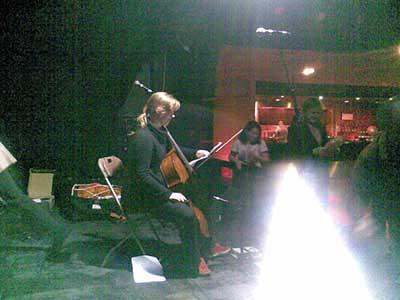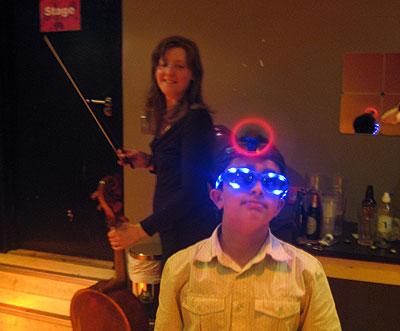Isle of Lismore
The total lack of phone signal on stage at ABC2 meant that I couldn’t call Catherine for her sackbut solo after all, but Robbie recorded a spoken message on my phone for me to use instead. What the set lacked in technical cohesion it made up for with spirit as expected, including such bizarre additions as a mutated theme from Here Come the Double Deckers making it into Daniel Johnston’s Mountain Top: Raymond Macdonald came up with a stonking Roy Wood-type sax riff for the intro, I said ‘that’s the Double Deckers theme’ and Duglas ended up singing ‘Get on board the Future Pilot’ if I remember rightly.

What was less chaotic was doing a couple of songs with Alasdair Roberts – Sushil invited the audience to join in the campaign to rescue Ali’s song Coral and Tar from its destined resting place as an obscure B-side. Come to think of it, we saw a whole new side to Ali when Finlay didn’t make it to the soundcheck and he stepped in on drums, transformed from his usual quiet mild-mannered self into a wild grinning animal on a determined mission behind the kit.
We weren’t the only bizarre set of the night: King Creosote was on after us and he sang the ‘La-Di-Da’ song that I first heard on a Francie and Josie LP we had on reel-to-reel when I was about 7. Now that was weird.
 Alison and Anurudh
Alison and Anurudh
I did make my stage laptop debut though, and with a phone, a harmonium and melodica, there was a real opportunity to play on stage, although perhaps Sushil introducing me as the Scottish Brian Eno was taking it several steps too far. The Phantom Band had two melodicas lying around the stage as well, but as I didn’t see their set (sheltering from the torrential rain in one of Sauchiehall Street’s noodle bars) I’ve no idea what they did with them.
Anyway, now we’re on holiday: no car, no work, I’m just reading Persepolis which I finally bought in the comic shop in Boston, and listening repeatedly to the Maria Kalaniemi albums I loaded onto my iPod before leaving. I’ll cycle the 3 miles down to the shop a bit later when the rain stops.
later
The sun came out; it was a beautiful day. I’m running up a tab at the shop and I just about managed to get everything home in my pannier, except for the cans of Guinness that fell off and exploded. At least it wasn’t my tyre that exploded, which is what happened in October the last time I cycled back from the shop. But I didn’t really mind, as the view up Loch Linnhe when cycling up the island with the wind behind you in the sunshine is profoundly cheering. And I went back and got more Guinness later when we all visited the café.
Thinking about what I wrote earlier, I’ve just realised that what’s still missing from most of my musical life is play. Here on holiday I still have lots of things to do, whether it’s the shopping or the washing up, but I now have some time to play; our kids, on the other hand, are free to play pretty much all of the time here. It’s not coincidental that we use the same verb 'play' for making sounds with an instrument, but playing really means being free to mess around, try things out, have fun, make mistakes and make discoveries. And if that’s in front of an audience as on Friday night, then even better. There was a moment in the middle of one song at the ABC when I looked down at my phone lying on the harmonium and thought ‘Will I pick up the phone, will I play some chords, will I set off some sound effects, what will I do?’ and the excitement of being able to play like that on stage was very real. I’ve no idea what it sounded like but it’s a freedom that I’m keen to revisit.
The theme of play comes back time and again in the thinking of musicians whose thoughts I read, whether it’s Robert Fripp talking about his friend Eno, or Fred Frith pointing out that an artist is someone who hasn’t forgotten how to play. Someone like Chris is extremely good at it too. I need to be able to make the time and space to let myself play, as most of the music-making process for me is just work, and it’s time I shifted the balance.
One of the problems with classical music generally and particularly with early music is that it’s labour-intensive, and especially preparation-intensive. To a greater or lesser extent you’re involved in an act of historical reconstruction, so you can’t just pick up your instrument and make music. You have to do your research, pick the right instrument and get it into playing condition, learn the notes, and get yourself through a large number of mental and physical processes before you can set yourself free to actually make some music. If the music involves a large number of people then the management of that becomes very complex too. When there are simpler options available, which offer a more satisfying and efficient music-to-effort ratio, this form of music-making becomes less and less attractive.
